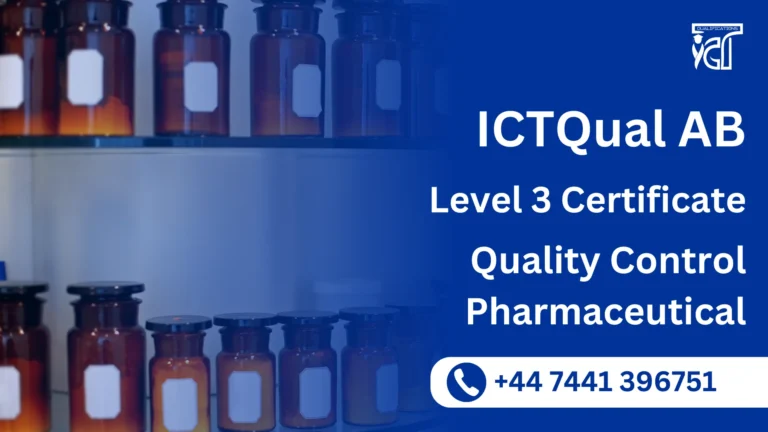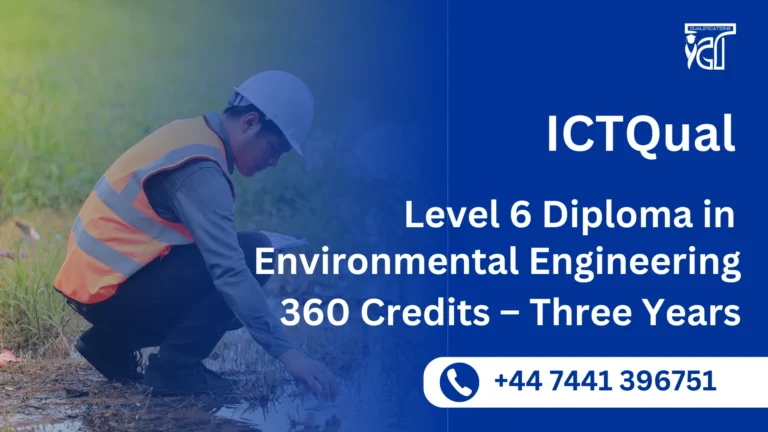In today’s complex and regulated business environments, maintaining high standards of health, safety, and environmental (HSE) management is not only a legal requirement—but a critical aspect of organisational success and sustainability. The ICTQual Level 8 Professional Diploma in Health, Safety and Environment is a prestigious, Ofqual-regulated qualification designed for experienced professionals aiming to lead and influence HSE policy, compliance, and performance at the highest levels.
This globally recognized, assignment-based diploma equips learners with strategic insights and advanced capabilities to manage workplace safety, environmental impact, and health compliance on a national and international scale.
The ICTQual Level 8 Professional Diploma in Health, Safety and Environment is a doctoral-level (RQF Level 8) professional qualification tailored for senior-level practitioners, HSE directors, and policy influencers. This course builds advanced competencies in HSE systems, risk management, sustainability, and strategic compliance.
Designed to reflect real-world applications and global industry standards, this diploma is ideal for those who want to develop, implement, and lead comprehensive HSE management systems that protect people, assets, and the environment.
This advanced qualification is focused on the strategic integration of health, safety, and environmental management into core business processes. Delivered entirely through assignment-based assessments, it is perfect for busy professionals seeking flexibility without compromising academic or practical quality.
The course promotes critical thinking, regulatory knowledge, and evidence-based decision-making aligned with international HSE frameworks and best practices. It supports learners in mastering how to influence safety culture, environmental responsibility, and sustainable development.
The ICTQual Level 8 Professional Diploma in Health, Safety and Environment is more than just a qualification—it’s a strategic credential that empowers professionals to lead with authority and purpose in the HSE field. With its Ofqual regulation, global recognition, and assignment-only format, this diploma offers the flexibility, credibility, and depth needed for real-world success.
If you’re ready to advance your career and create lasting impact in health, safety, and sustainability—enrol today and become a leader in shaping safer, healthier, and more responsible workplaces worldwide.
ICTQual Level 8 Professional Diploma in Health, Safety and Environment
The ICTQual Level 8 Professional Diploma in Health, Safety and Environment have the following study units”
- Advanced Risk Management and Assessment
- Legislative and Regulatory Frameworks in Health, Safety, and Environment
- Environmental Management and Sustainability
- Health and Safety Leadership and Culture
- Capstone Research in Health, Safety, and Environment
GLH (Guided Learning Hours) and TQT (Total Qualification Time) are terms commonly used in vocational qualifications to help define the amount of time a learner is expected to spend on their studies.
1. GLH (Guided Learning Hours)
GLH refers to the number of hours a learner spends being directly taught, supervised, or supported during their course. This includes the time spent in activities such as:
- Classroom instruction
- Practical workshops
- One-on-one tutoring or mentoring sessions
- Online learning sessions with tutor support
In other words, GLH represents the time that learners are actively engaged with their instructors or learning activities.
2. TQT (Total Qualification Time)
TQT represents the total amount of time a learner is expected to invest in completing a qualification, including:
- GLH (Guided Learning Hours): Time spent on direct learning, as explained above.
- Self-Directed Learning: This includes time spent on independent study, research, assignment completion, preparation for exams, and any other work the learner does outside of direct teaching hours.
TQT is a broader measure that includes all the time required to achieve the qualification. It helps learners and employers understand the overall commitment required for the qualification.
Key Differences Between GLH and TQT:
- GLH focuses on direct learning with guidance or supervision.
- TQT includes GLH as well as independent study time and other learning-related activities.
Example:
If a qualification has a TQT of 600 hours and a GLH of 250 hours, it means the learner should spend 250 hours in direct learning (classroom, online, or tutor-led sessions) and 350 hours on independent study or research.
Study Unit 1: Advanced Risk Management and Assessment
- Critically evaluate and apply sophisticated risk assessment techniques and methodologies to identify and control complex workplace hazards.
- Design and implement comprehensive risk management frameworks tailored to specific organizational contexts, ensuring effective hazard mitigation.
- Utilize and integrate advanced quantitative and qualitative risk analysis tools to assess risk scenarios accurately and develop robust control measures.
- Analyse and synthesize case studies from diverse industries to derive best practices and innovative solutions for managing complex risks.
Study Unit 2: Legislative and Regulatory Frameworks in Health, Safety, and Environment
- Demonstrate an in-depth understanding of international and national HSE laws and regulations, including their historical evolution and contemporary application.
- Develop and implement detailed compliance strategies that align with regulatory requirements and industry best practices, ensuring organizational adherence to legal standards.
- Critically assess the impact of HSE legislation on organizational policies and procedures, and devise strategies to integrate legal requirements seamlessly into business operations.
- Conduct a comparative analysis of global HSE regulations to identify differences and commonalities, enabling the formulation of globally compliant HSE strategies.
Study Unit 3: Environmental Management and Sustainability
- Apply advanced principles of environmental management and sustainability to develop innovative solutions for contemporary environmental challenges.
- Design, implement, and evaluate comprehensive environmental management systems (EMS) that promote sustainability and regulatory compliance within organizations.
- Assess environmental impacts using advanced methodologies and develop effective mitigation strategies to minimize organizational ecological footprints.
- Implement cutting-edge techniques for sustainable resource management and waste reduction, drawing from successful environmental management initiatives.
Study Unit 4: Health and Safety Leadership and Culture
- Apply advanced leadership theories and practices to health, safety, and environmental management, fostering a culture of safety and sustainability within organizations.
- Design and implement strategies to build and sustain a positive HSE culture, driving continuous improvement and engagement at all organizational levels.
- Develop and execute effective communication and training programs that enhance HSE awareness and competence among employees.
- Analyse psychological and sociological aspects of workplace safety culture to develop interventions that address human factors and improve overall safety performance.
- Critically evaluate case studies of successful HSE leadership and cultural transformation to identify key success factors and best practices.
Research Project: Capstone Research in Health, Safety, and Environment
- Conduct independent, advanced-level research on a contemporary issue in health, safety, and environmental management, contributing new insights to the field.
- Apply rigorous research methodologies and analytical tools to investigate HSE topics, ensuring the validity and reliability of findings.
- Develop a thorough research proposal, including a detailed literature review, robust data collection methods, and sophisticated data analysis techniques.
- Present research findings and practical recommendations effectively to diverse stakeholders, showcasing the research’s relevance and applicability.
- Make a significant contribution to the body of knowledge in HSE management, addressing gaps and proposing innovative solutions to contemporary challenges.
These learning outcomes ensure that graduates of the Level 8 Professional Diploma in Health, Safety, and Environment are equipped with the advanced knowledge and skills necessary to excel in senior HSE roles, driving innovation and excellence in their organizations.
Benefits of ICTQual Level 8 Professional Diploma in Health, Safety and Environment
- Globally Recognized Qualification
This diploma is Ofqual-regulated and accepted by employers, regulatory bodies, and institutions worldwide, enhancing your international career prospects. - Doctorate-Level Expertise
Gain a prestigious RQF Level 8 qualification, equipping you with advanced knowledge in occupational health, safety, and environmental management. - 100% Assignment-Based Learning
No exams—just flexible, practical assessments that allow working professionals to study while managing their careers and responsibilities. - Strategic HSE Leadership Skills
Develop the ability to lead, design, and implement high-level health, safety, and environmental strategies across various industries. - Improved Legal and Regulatory Compliance
Understand and apply global health and safety regulations, environmental laws, and best practices to reduce risk and ensure compliance. - Career Advancement Opportunities
Ideal for professionals aiming for roles such as HSE Director, Compliance Manager, Risk Consultant, or Corporate Sustainability Leader. - Stronger Safety Culture and Sustainability Focus
Learn how to build a strong safety-first culture and integrate sustainable environmental practices into organisational operations. - Increased Professional Credibility
Achieve recognition as a health and safety expert, enabling you to lead internal teams or consult for major organisations and government agencies. - Applicable Across Industries
The skills and knowledge gained are relevant to construction, oil & gas, manufacturing, logistics, public sector, and more. - Pathway to Doctoral Research and Consulting
Open doors to further academic opportunities or establish your own HSE consultancy, influencing policy and best practices on a larger scale.
These benefits not only highlight the value of the course but are also structured to help improve visibility in search engines for relevant keywords like “Level 8 HSE diploma”, “Health and Safety management course”, and “Ofqual regulated environmental qualification”.
Best Fit for ICTQual Level 8 Professional Diploma in Health, Safety and Environment
The ICTQual Level 8 Professional Diploma in Health, Safety and Environment is tailored for professionals who are ready to lead at a strategic level in occupational health, safety, and environmental management.
Senior Health and Safety Professionals
- Suitable for experienced HSE managers, directors, and officers.
- Ideal for those overseeing workplace health and safety policies and systems.
Compliance and Risk Management Specialists
- Designed for professionals responsible for legal compliance, internal audits, and risk governance.
- Valuable for those managing cross-border HSE regulatory requirements.
Environmental and Sustainability Leaders
- Perfect for individuals leading environmental initiatives and sustainability programs.
- A great fit for those integrating sustainable practices within corporate operations.
Corporate Executives and Policy Advisors
- Ideal for C-level executives, board members, and decision-makers responsible for HSE performance and strategy.
- Relevant for government officials and advisors shaping public health and safety policy.
Academics, Trainers, and HSE Consultants
- Valuable for those contributing to research or providing expert-level advisory services.
- Appropriate for experienced trainers, university lecturers, or HSE consultants seeking formal recognition at Level 8.
Entry Requirements
Register Now
Qualification Process
Qualification Process for the ICTQual Level 8 Professional Diploma in Health, Safety and Environment
- Self-Assessment:
Begin by evaluating your eligibility to ensure you meet the qualification requirements, including work experience, knowledge, and language proficiency. - Registration:
Complete your registration by submitting the required documents, including a scanned copy of a valid ID, and paying the registration fee. - Induction:
An assessor will conduct an induction to confirm your eligibility for the course and explain the evidence requirements. If you do not meet the criteria, your registration will be canceled, and the fee will be refunded. - Assignmnets & Evidence Submission:
Provide all assignmnets and the necessary evidence based on the assessment criteria outlined in the course. If you are unsure of the required evidence, consult with the assessor for guidance on the type and nature of evidence needed. - Feedback and Revision:
The assessor will review your submitted evidence and provide feedback. Evidence that meets the criteria will be marked as “Criteria Met,” while any gaps will be identified. You will be asked to revise and resubmit if needed. - Competence Evidence:
Submit final evidence demonstrating that all learning outcomes have been met. This evidence will be marked as “Criteria Met” by the assessor once it is satisfactory. - Internal Quality Assurance (IQA):
The Internal Quality Assurance Verifier (IQA) will review your evidence to ensure consistency, quality, and compliance with standards. - External Verification:
The IQA will submit your portfolio to ICTQUAL AB External Quality Assurance Verifiers (EQA) for final confirmation. The EQA may contact you directly to verify the authenticity of your evidence. - Certification:
Upon successful completion of all checks, ICTQUAL AB will issue your official certificate, confirming that you have attained the ICTQual Level 8 Professional Diploma in Health, Safety and Environment.







